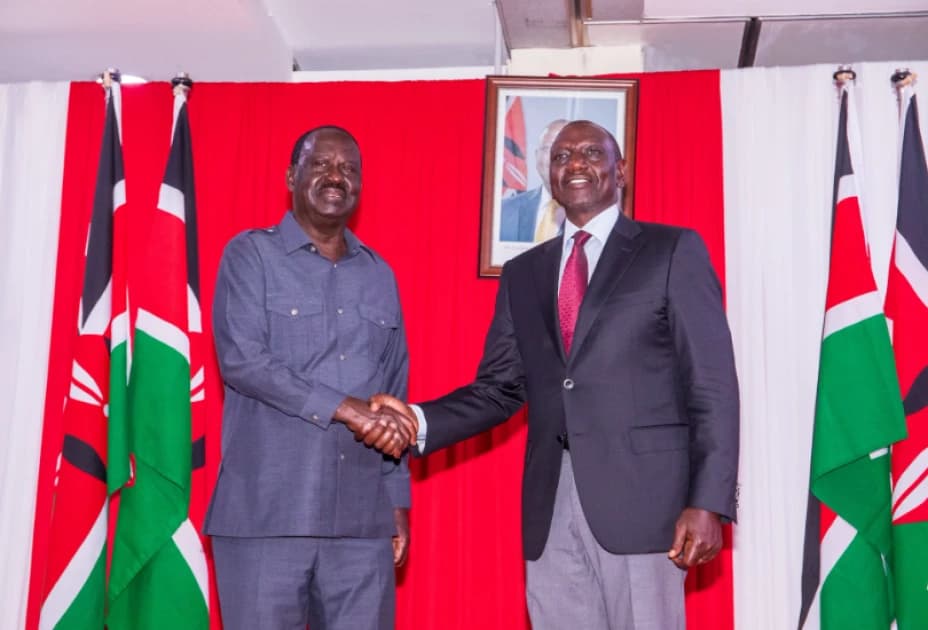We're loading the full news article for you. This includes the article content, images, author information, and related articles.
A nationwide TIFA Research poll finds 56 % of Kenyans oppose President Ruto and Raila Odinga’s plan for a broad-based government, with respondents saying it would not tackle rising living costs or unemployment.

Nairobi, Kenya — 2025-09-11 14:00 EAT. A survey by Trends and Insights for Africa (TIFA Research) shows 64 percent of Kenyans now oppose the Broad-Based Government (BBG) initiative between President William Ruto and ODM leader Raila Odinga. Support stands at 29 percent, with 7 percent undecided. Citizens cite cost of living, economic decline, and weak accountability as key concerns.
What happened now: The TIFA poll, conducted between August 23 and September 3, 2025, on a sample of 2,023 registered voters across 47 counties, indicates growing disapproval of the Ruto-Raila Broad-Based Government—64 percent oppose it, 29 percent support, and 7 percent are undecided.
Why it matters: The results suggest the BBG has failed to gain broad public trust and may face political risk ahead of the 2027 elections. Opposition is also strong among young Kenyans.
Status: Confirmed; findings published recently.
The Broad-Based Government was announced in July 2024 as a partnership between UDA and ODM to increase political stability and national unity after protests and widespread discontent.
This is not the first poll: in May 2025, TIFA found 54 percent opposed the BBG, with 22 percent supporting. The new poll shows opposition has increased while support has modestly risen.
Key grievances driving opposition include rising cost of living, high taxes, corruption, and perceived failure of government to deliver on economic promises.
Mandate: TIFA Research is a polling firm; the BBG is a political initiative under the cooperation pact between UDA and ODM.
Policies: No legal or constitutional requirement mandates a broad-based government; it is political design.
What should happen next:
• Government may need to engage in public consultations or policy adjustments to address citizen concerns.
• Strengthen transparency on how BBG is delivering promised outcomes (jobs, cost relief, anti-corruption).
• Political opponents and civil society may use these findings to press for accountability.
TIFA Research / Maggie Ireri (CEO): Highlighted growing opposition from 54 percent in May to 64 percent now, and a smaller but rising support base.
Respondents (public): Young people especially critical; in many counties support remains below 40 percent even where government is strong.
Analysts / Political Commentators: Suggest BBG seen as elite arrangement; unless it delivers tangible benefits people may still reject it. (Implied in poll commentary.)
|
Detail |
Data |
|---|---|
|
Sample size |
2,023 registered voters across all 47 counties |
|
Opposition to BBG |
64 percent |
|
Support for BBG |
29 percent |
|
Undecided / Neutral |
7 percent |
|
Change since May 2025 |
Opposition rose from ~54 percent to 64 percent; support from ~22 percent to ~29 percent |
Political risk: Unless BBG delivers visible economic relief, this opposition could hurt UDA, ODM, or government standing in 2027.
Governance concern: Citizens may increasingly distrust political agreements as symbolic rather than transformative.
Potential instability: High dissatisfaction may fuel protests or unrest, especially among youths.
Which demographic groups (region, income) have shifted hardest in opinion.
Specific policies within BBG that citizens want changed.
Whether opposition will translate into political alignment or voting behaviour in 2027.
How the government will respond to this shift in public sentiment.
May 2025: TIFA poll found 54 percent opposed BBG, 22 percent in support.
Aug 23–Sep 3, 2025: Current poll period.
September 2025: Publication of survey results.
Government’s messaging and policy changes in response to poll.
Whether BBG yields any new policy deliverables (cost relief, jobs, anti-corruption) to sway opinion.
Poll trends leading up to 2027: tracking whether opposition remains or softens.
Keep the conversation in one place—threads here stay linked to the story and in the forums.
Sign in to start a discussion
Start a conversation about this story and keep it linked here.
Other hot threads
E-sports and Gaming Community in Kenya
Active 9 months ago
The Role of Technology in Modern Agriculture (AgriTech)
Active 9 months ago
Popular Recreational Activities Across Counties
Active 9 months ago
Investing in Youth Sports Development Programs
Active 9 months ago
Key figures and persons of interest featured in this article